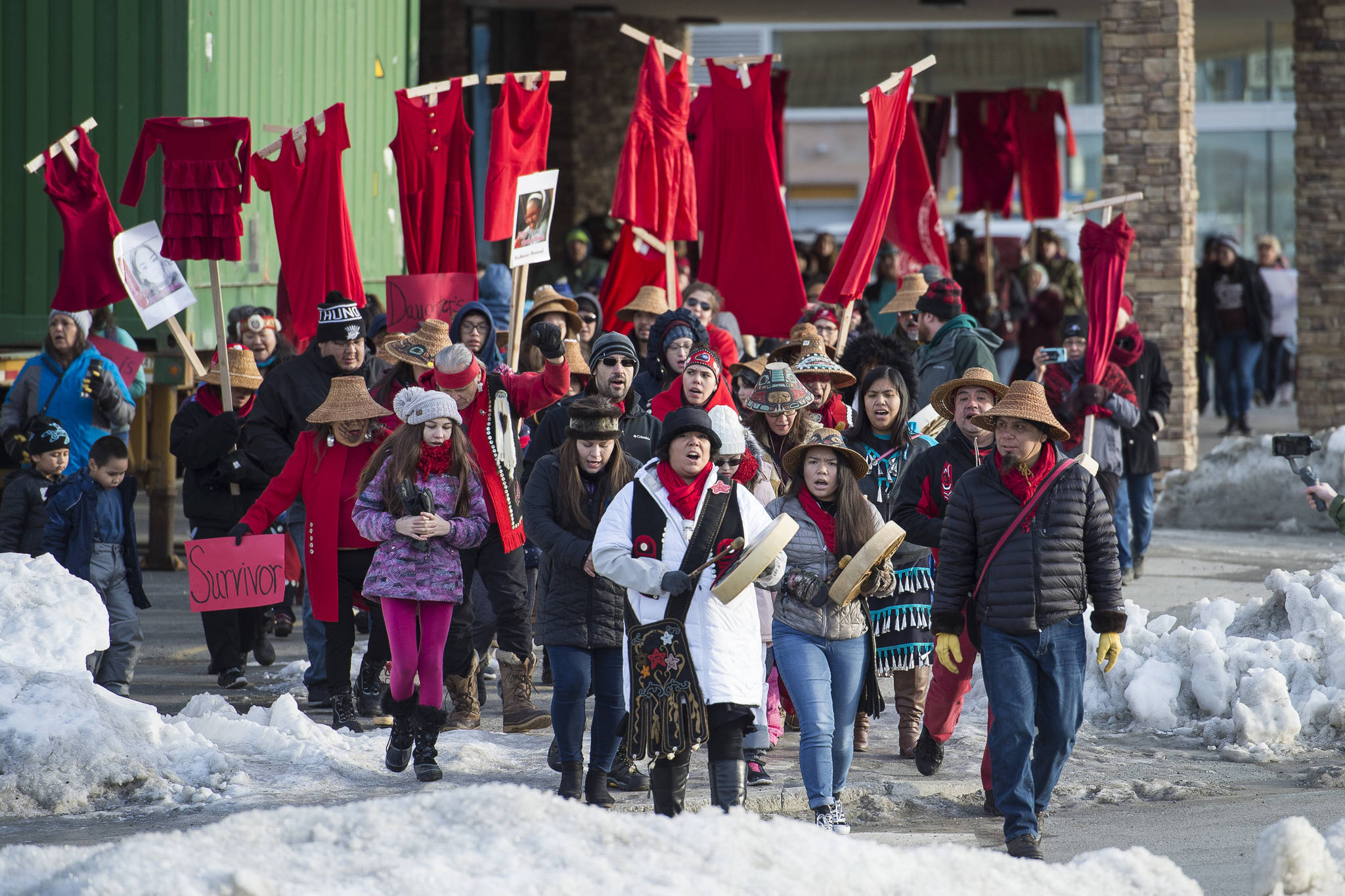Many of the sights and sounds at Saturday’s Women’s March in Juneau were reminiscent of the past two Women’s Marches: the pink hats, the signs, the encouragement to vote.
One striking sight was new. More than a dozen red dresses, held up on wooden posts, were illuminated in the sunlight in front of the Alaska State Capitol. The dresses were meant to bring attention to missing and murdered indigenous women. There were specific signs carrying the images of Jade Williams, a 19-year-old who was killed in Kake in 2017, and Mackenzie Howard, a 13-year-old girl who was killed in Kake in 2013.
Miciana Hutcherson, a Tlingit woman and one of the speakers at Saturday’s march, delivered a gripping address about missing, murdered and forgotten Native women.
“I’m not here with a sheet full of statistics,” Hutcherson said. “I’m here as a Native woman who can’t stand to see another missing poster for my friend’s cousin, or my neighbors, or my cousin’s aunt. I’m here because I want to go back to the days where I associated red dresses with Valentine’s Day and not missing and murdered indigenous women.”
[Photos: Missing indigenous women at forefront of Juneau’s women’s march]
Hutcherson, who was an emerging leader on Central Council Tlingit and Haida Indian Tribes of Alaska’s (CCTHITA) 2016-2017 executive council, was one of seven speakers during the hourlong event that has turned into an annual event since the first one in 2017. Rep. Sara Hannan, D-Juneau, was the master of ceremonies.
In addition to the seven speakers, Nancy Keen welcomed attendees by singing the Warrior Women Song. The song echoed through downtown Juneau in the minutes leading up to the rally, as people made their way down the icy sidewalks on their way to the Capitol.
Organizers estimated more than 650 people attended, filling the street before marching to Centennial Hall, where there was a Women’s March Action Fair from 11 a.m.-1 p.m. Local nonprofits and community groups had tables at the fair, offering information on what they do and how to get involved.
[Sitka woman testifies in Washington, D.C. about missing, murdered Alaska Native women]
The theme of missing and murdered indigenous women wove through most of the speeches. According to a November 2018 study from the Urban Indian Health Institute, cities in Alaska and around the country are not adequately identifying or reporting cases of missing and murdered indigenous women. Sitka woman Patricia Alexander recently testified in Washington, D.C., urging the federal government to provide more resources and better training to law enforcement agencies so they can better report and track cases of missing or murdered indigenous women.
Hutcherson drove home the same point, saying that the federal government wants to own reservations and indigenous lands, but doesn’t seem to want to commit the resources to take care of the people.
John Garcia, another speaker, talked about toxic male attitudes toward women and how men need to be more aware of their inherent privilege. It’s important to start teaching boys young about how to respect and hold up women. Garcia also ended his address by referring to the plight of Native women, and specifically asked for nobody to applaud his speech.
“Nothing I’ve said here is new,” Garcia said. “It’s been said before. So I just ask for a moment of silence for our missing indigenous women. The ones that were murdered, the ones that people just don’t know about.”
Garcia handed the microphone back to Hannan and walked down the steps in silence. The only sound was the soft humming of the amplifiers.
The speakers covered a wide array of topics, from protecting the environment to fighting for the rights of all women.
[At candlelight vigil, Juneau residents remember transgender lives lost]
U.S. Coast Guard Capt. Allison Caputo, a transgender woman, told her story of trying to live as someone she wasn’t and even contemplating suicide at one point. Instead, she called a Coast Guard helpline, was diagnosed with gender dysphoria and ended up transitioning in 2017. Caputo gave attendees a homework assignment.
“Bring your trans or non-binary friends to a community activity,” Caputo said. “The No. 1 way to eliminate prejudice is for people to personally know those affected by it.”
Almost every speaker urged people to become politically active. Hannan asked the crowd to raise their hands if they got involved in last fall’s elections in any way.
“Did you write a letter? Did you hold a sign? Did you go to a rally? Did you remember to vote?” Hannan said, looking around the crowd as gloved hands raised in the air. “That’s how we make change, because this is what democracy looks like.”
• Contact reporter Alex McCarthy at 523-2271 or amccarthy@juneauempire.com. Follow him on Twitter at @akmccarthy.

